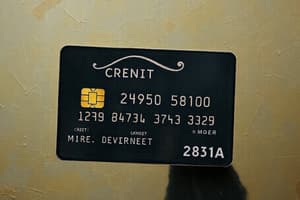Podcast
Questions and Answers
What is credit?
What is credit?
An arrangement to receive cash, goods, or services now and pay for them in the future
What is consumer credit?
What is consumer credit?
The use of credit for personal needs
What is a creditor?
What is a creditor?
An entity that lends money
What is close-end credit?
What is close-end credit?
What is open-ended credit?
What is open-ended credit?
What is a line of credit?
What is a line of credit?
What is a grace period?
What is a grace period?
What is a finance charge?
What is a finance charge?
What is net income?
What is net income?
What is the annual percentage rate (APR)?
What is the annual percentage rate (APR)?
What is collateral?
What is collateral?
What is simple interest?
What is simple interest?
What is the minimum monthly payment?
What is the minimum monthly payment?
What is a credit rating?
What is a credit rating?
What does cosigning a loan mean?
What does cosigning a loan mean?
What is bankruptcy?
What is bankruptcy?
Explain the concept of consumer credit.
Explain the concept of consumer credit.
Differentiate between open-ended and close-end credit.
Differentiate between open-ended and close-end credit.
Identify the 5 C's of credit.
Identify the 5 C's of credit.
Discuss factors to consider when choosing a loan or credit card.
Discuss factors to consider when choosing a loan or credit card.
What steps should you take if your identity is stolen?
What steps should you take if your identity is stolen?
Explain the role of consumer counseling services.
Explain the role of consumer counseling services.
Flashcards
What is Credit?
What is Credit?
Access to cash, goods, or services now, with payment later.
What is Consumer Credit?
What is Consumer Credit?
Credit used to cover an individual's personal needs.
Who are Creditors?
Who are Creditors?
Entities that lend money to individuals or businesses.
What is Closed-End Credit?
What is Closed-End Credit?
Signup and view all the flashcards
What is Open-Ended Credit?
What is Open-Ended Credit?
Signup and view all the flashcards
What is a Line of Credit?
What is a Line of Credit?
Signup and view all the flashcards
What is a Grace Period?
What is a Grace Period?
Signup and view all the flashcards
What is a Finance Charge?
What is a Finance Charge?
Signup and view all the flashcards
What is Net Income?
What is Net Income?
Signup and view all the flashcards
What is APR?
What is APR?
Signup and view all the flashcards
What is Collateral?
What is Collateral?
Signup and view all the flashcards
What is Simple Interest?
What is Simple Interest?
Signup and view all the flashcards
What is the Minimum Monthly Payment?
What is the Minimum Monthly Payment?
Signup and view all the flashcards
What are Credit Ratings?
What are Credit Ratings?
Signup and view all the flashcards
What is Cosigning a Loan?
What is Cosigning a Loan?
Signup and view all the flashcards
What is Bankruptcy?
What is Bankruptcy?
Signup and view all the flashcards
What are the Five C's of Credit?
What are the Five C's of Credit?
Signup and view all the flashcards
What to consider when selecting a loan or credit card?
What to consider when selecting a loan or credit card?
Signup and view all the flashcards
What steps to take during Identity Theft recovery?
What steps to take during Identity Theft recovery?
Signup and view all the flashcards
What is the role of Consumer Counseling Services?
What is the role of Consumer Counseling Services?
Signup and view all the flashcards
Study Notes
Credit Fundamentals
- Credit allows immediate access to cash, goods, or services with payment deferred to a later date.
- Consumer credit is specifically used for personal needs.
Key Entities and Types of Credit
- Creditors are entities that lend money to individuals or businesses.
- Close-end credit is a one-time loan repaid through equal payments over a set period.
- Open-ended credit allows borrowing up to a specified limit for various purchases.
Credit Management Terms
- A line of credit represents the maximum borrowing amount allowed by a creditor.
- A grace period allows time without accruing interest on a credit account.
- Finance charge is the total cost incurred from using credit, expressed in dollar amounts.
Income and Rates
- Net income refers to the income received after taxes and deductions.
- The annual percentage rate (APR) indicates the yearly cost of credit as a percentage.
Loan Security and Interest
- Collateral serves as a security measure to assure repayment of a loan.
- Simple interest is calculated solely on the principal borrowed amount.
Payments and Ratings
- The minimum monthly payment is the least amount required to maintain good standing on a loan.
- Credit ratings assess an individual's capacity and reliability in making timely payments.
Loan Responsibilities
- Cosigning a loan involves accepting responsibility for the repayment if the primary borrower defaults.
Debt Consequences
- Bankruptcy is a legal process for asset distribution among creditors when a debtor cannot repay debts.
Consumer Credit Concepts
- Consumer credit allows addressing personal financial needs with deferred payment.
- Differentiation between open-ended credit (flexible limits) and close-end credit (fixed payments) is crucial for financial planning.
Five C's of Credit
- The five C's: character, capacity, capital, collateral, and credit history, are vital for creditors when evaluating loan applications.
Loan and Credit Card Selection
- Considerations in selecting a loan or credit card include loan duration, monthly payment amounts, and applicable interest rates.
Identity Theft Recovery Steps
- In the event of identity theft, promptly contact all credit card companies, close compromised accounts, and adjust PINs. Notify authorities and credit bureaus for assistance.
Role of Consumer Counseling Services
- Consumer counseling services assist in managing debt through negotiations with creditors, with bankruptcy being a final option for resolution.
Studying That Suits You
Use AI to generate personalized quizzes and flashcards to suit your learning preferences.




